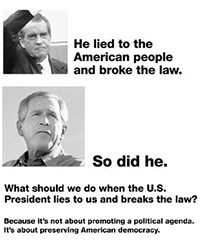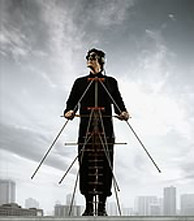Home / War on Terror
Meet Russ Tice, a whistleblower in the NSA warrantless electronic surveillance program and former NSA official, fired last year, who is asking to testify at Congressional hearings on the program.
"I intend to report to Congress probable unlawful and unconstitutional acts conducted while I was an intelligence officer with the National Security Agency and with the Defense Intelligence Agency," Mr. Tice stated in the Dec. 16 letters, copies of which were obtained by The Washington Times.
The letters were sent the same day that the New York Times revealed that the NSA was engaged in a clandestine eavesdropping program that bypassed the secret Foreign Intelligence Surveillance Act (FISA) court. The FISA court issues orders for targeted electronic and other surveillance by the government.
....In his Dec. 16 letter, Mr. Tice wrote that his testimony would be given under the provisions of the 1998 Intelligence Community Whistleblower Protection Act, which makes it legal for intelligence officials to disclose wrongdoing without being punished.
[hat tip Patriot Daily.]
(26 comments) Permalink :: Comments

Who would know better what is required of the Government when it comes to electornic surveillance of foreign intelligence targets than the FISA Court judges? Why would we take Bush's word or that of his middle level legal advisors over their's?
The Washington Post reports FISA judges want answers. They are scheduled to be briefed on Bush's warrantless NSA electronic surveillance program on Monday:
Several judges on the Foreign Intelligence Surveillance Court said they want to hear directly from administration officials why President Bush believed he had the authority to order, without the court's permission, wiretapping of some phone calls and e-mails after the Sept. 11, 2001, attacks. Of serious concern to several judges is whether any information gleaned from intercepts by the National Security Agency was later used to gain their permission for wiretaps without the source being disclosed.
Can you say Fruit of the Poisonous Tree?
(31 comments, 400 words in story) There's More :: Permalink :: Comments
GW Law Prof Orin Kerr has a theory on the NSA warrantless surveillance program, based upon some material in James Risen's book. Orrin is very much an expert in these issues. One of his articles is Kerr, Orin S., "Internet Surveillance Law After the USA Patriot Act: The Big Brother That Isn't" . Northwestern University Law Review, Vol. 97, 2003 (downloadable here.)
Orin thinks the program may have involved packet-sniffing which he likens to a giant pen register or trap and trace (the former records numbers dialed from a phone, the latter records telephone numbers of incoming calls and neither intercept the content of communications) rather than data-mining.
Packet sniffing refers to installing a monitoring device on a steam of traffic that looks for specific sequences of letters, numbers, or symbols.....The term "data-mining" is usually used to mean taking an already-gathered database of information, and then performing analysis on the gathered database in lots of ways to identify patterns and characteristics.
(10 comments, 279 words in story) There's More :: Permalink :: Comments
President Bush held a meeting yesterday with prosecutors, complaining that Congress was not getting behind the renewal of the Patriot Act. Prosecutors did their best to rally behind him.
Thankfully, there are Senators like Russ Feingold who are not yielding:
Sen. Russ Feingold, D-Wis., said Bush should spend more time negotiating about the Patriot Act with Democrats and others on Capitol Hill and less on "staged meetings with hand-picked participants" at the White House.
"Contrary to the president's misleading comments, nobody wants to see the Patriot Act expire," Feingold said Tuesday. "We want commonsense changes to the act that would give the government the power to combat terrorism while protecting the rights and freedoms of law-abiding citizens.
(42 comments, 189 words in story) There's More :: Permalink :: Comments
Former Republican Rep. Bob Barr has a new column in Time Magazine on how Bush's warrantless NSA surveillance program damages the U.S.
Let's focus briefly on what the President has done here. Exactly like Nixon before him, Bush has ordered the National Security Agency (NSA) to conduct electronic snooping on communications of various people, including U.S. citizens. That action is unequivocally contrary to the express and implied requirements of federal law that such surveillance of U.S. persons inside the U.S. (regardless of whether their communications are going abroad) must be preceded by a court order.
(6 comments, 247 words in story) There's More :: Permalink :: Comments
Geoffrey R. Stone is a Distinguished Service Professor of Law at the University of Chicago. He also is the former Dean of the law school and former Provost of the University of Chicago. His most recent book, Perilous Times: Free Speech in Wartime from the Sedition Act of 1798 to the War on Terrorism (W.W. Norton 2004), received both the Robert F. Kennedy Book Award and the Los Angeles Times Book Prize for the Best Book of the Year in History.
Today, over at Huffington Post, Professor Stone analyzes Bush's warrantless NSA electronic surveillance program in the context of the Fourth Amendment.
Here's a snippet:
(5 comments, 569 words in story) There's More :: Permalink :: Comments
Earlier I wrote about today's New York Times article highlighting Alberto Gonzales' and Andrew Cards' 2004 hospital visit to former Attorney General John Ashcroft to get him to sign off on an extension of Bush's warrantless NSA electronic surveillance program.
The Times implies, but does not state, that Ashcroft refused. Newsweek confirms his refusal:
in March 2004, White House chief of staff Card and White House Counsel Gonzales visited Ashcroft, the seriously ill attorney general, to try to get him to overrule Comey, who was officially acting as A.G. while Ashcroft was incapacitated. Ashcroft refused, and a battle over what to do broke out in the Justice Department and at the White House. Finally, sometime in the summer of 2004, a compromise was reached, with Comey onboard: according to an account in The New York Times, Justice and the NSA refined a checklist to follow in deciding whether "probable cause" existed to start monitoring someone's conversations.
(10 comments, 1003 words in story) There's More :: Permalink :: Comments
The New York Times reports major news in the NSA warrantless electronic surveillance story: When it came time for an extension of the program in 2004, former Attorney General John Ashcroft was in intensive care recovering from pancreatitis. Then Deputy AG James Comey objected to some aspects of the program and refused to sign off on it. Alberto Gonzales (then White House Counsel) and Andrew Card actually went to see Ashcroft in the hospital to get him to sign off on it.
Accounts differed as to exactly what was said at the hospital meeting between Mr. Ashcroft and the White House advisers. But some officials said that Mr. Ashcroft, like his deputy, appeared reluctant to give Mr. Card and Mr. Gonzales his authorization to continue with aspects of the program in light of concerns among some senior government officials about whether the proper oversight was in place at the security agency and whether the president had the legal and constitutional authority to conduct such an operation.
It is unclear whether the White House ultimately persuaded Mr. Ashcroft to give his approval to the program after the meeting or moved ahead without it.
(24 comments, 496 words in story) There's More :: Permalink :: Comments
So Alberto Gonzales has decided the Justice Department will probe the whistleblowers who leaked the information about Bush's warrantless NSA surveillance to the New York Times. Typical. What we need is a special counsel to investigate Bush's actions, not the whistleblowers.
The ACLU has issued this press release in response:
"President Bush broke the law and lied to the American people when he unilaterally authorized secret wiretaps of U.S. citizens. But rather than focus on this constitutional crisis, Attorney General Gonzales is cracking down on critics of his friend and boss. Our nation is strengthened, not weakened, by those whistleblowers who are courageous enough to speak out on violations of the law."
"To avoid further charges of cronyism, Attorney General Gonzales should call off the investigation. Better yet, Mr. Gonzales ought to fulfill his own oath of office and appoint a special counsel to determine whether federal laws were violated."
This sounds like a job for GAP, EPIC's Government Accountability Project.
(29 comments, 308 words in story) There's More :: Permalink :: Comments

The ACLU has a full page ad in today's New York Times calling for a special counsel to investigate Bush and the NSA warrantless electronic surveillance. This is an abridged version, minus most of the text, but you can view the full ad here.
In a press release, the ACLU says:
(60 comments, 176 words in story) There's More :: Permalink :: Comments
by TChris
In an emergency filing yesterday, the Solicitor General asked the Supreme Court to transfer Jose Padilla to a civilian court despite the Fourth Circuit’s bewilderment at the Justice Department’s flip-flopping claim that Padilla is an enemy combatant. The SG argued that the Fourth Circuit’s decision amounted to “an unwarranted attack on the exercise of executive discretion.â€
Firing back today, Padilla’s lawyers seized the chance to embarrass the Bush administration with the recent news that the president used his “executive discretion†to intercept telephone calls of persons who were within the nation’s borders and subject to the protections of the nation’s laws without obtaining a warrant.
Lawyers Donna Newman and Andrew Patel told the high court in papers filed Tuesday that the justices must step in "to preserve the vital checks and balances" on the president.
(20 comments, 448 words in story) There's More :: Permalink :: Comments

News organizations are reporting that FISA surveillance was up again in 2004, and that the Court did not rubber stamp all requests, but asked the Bush Administration to modify several.
In 2002, there were 1238 FISA warrants issued, up from 934 in 2001. All requests were granted in both years. In 2003, the number jumped to 1727, and in 2004, to 1758. A full chart is available here.
In 2003, the FISA Court rejected 4 and modified 79 of the Government's requests for warrants. In 2004, the Court modified 94 of the applications. None were denied, but three were withdrawn by the Government before the FISA court acted on it.
The latest available report is for 2004 and available here. (pdf).
The 2004 report on ordinary wiretaps is here. More analysis is available here.
(6 comments) Permalink :: Comments
| << Previous 12 | Next 12 >> |







